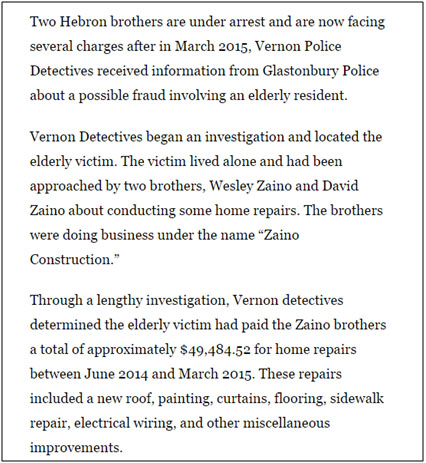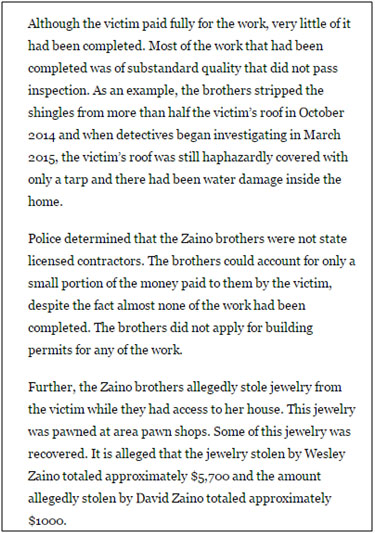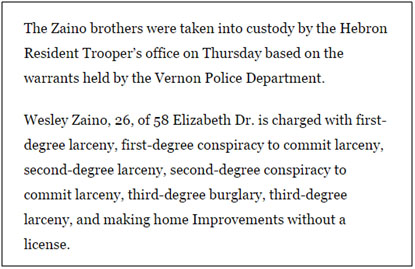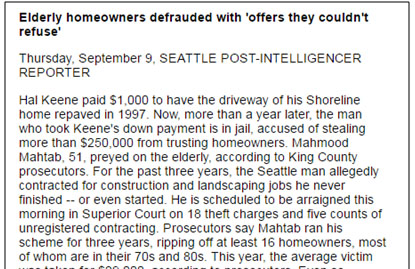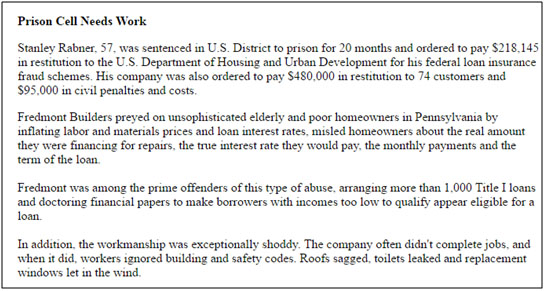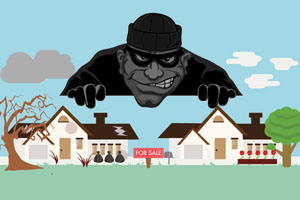Invisible Home Improvements Scams
The "Invisible Home Improvements" trick is one of the scams the BBB received a large number of complaints about in 2013. According to Smitherman, home improvement scams change very little from year to year, and most involve poor-quality workmanship from unlicensed or untrained workers.
The hardest scams for homeowners to detect—and therefore the easiest for scammers to pull off—are repairs or improvements to areas of the home that are not easily visible, such as roofs, chimneys, air ducts, and crawl spaces.
He says scammers might simply knock on your door, offering a great deal under the pretense that they were "in the neighborhood." However, they are increasingly using telemarketing, email, and even social media to reach homeowners.
Invisible home improvement scams involve deceptive practices in which scammers offer supposed improvements to a home's infrastructure, but perform little to no actual work. These scams often target homeowners through misleading advertisements, door-to-door solicitations, or unsolicited phone calls. Scammers use high-pressure tactics to rush homeowners into quick decisions, promising repairs or enhancements that are either substandard or never completed. Victims may end up overpaying for minimal or nonexistent work, often falling for intimidation tactics that imply urgent repairs are needed. To protect against invisible home improvement scams, homeowners should thoroughly research contractors, obtain multiple estimates, carefully review contracts, avoid large upfront payments, resist high-pressure sales tactics, and ensure that contractors are properly licensed and insured. Staying vigilant and informed is key to avoiding these deceptive practices in the home improvement industry.


If you are a victim of Ghana fraud, submit the scammer's details here.
Invisible home improvement scams are one of the most common types of fraud carried out by scammers. These scammers often target the elderly and home-based women who may lack sufficient knowledge of such deceptive tactics. They attempt to sell a product or service that either holds no real value for the buyer or they continuously delay the work while extracting money during the process.
Few of the most common home improvement scams
1. Special Deal, Today Only or Left-Over Product
Scam artists posing as contractors may show up at your doorstep claiming they were just passing through the neighborhood and have leftover materials from a previous job. Cities recently hit by natural disasters are prime targets for these scammers, who appear offering to repair damaged homes. They may begin the repair work, but once they are paid, they either don’t return or fail to deliver quality workmanship. In some cases, they may attempt to steal valuables such as jewelry, antiques, money, or other possessions while working inside the home. Sometimes, they even convince homeowners to approve unnecessary repairs.
Consumers should exercise caution when approached with promotions like “special deal, today only” or claims of “leftover products.” While some businesses may offer legitimate time-sensitive discounts, scammers often exploit these tactics to pressure consumers into making hasty decisions. Before committing to a purchase or service, research the company’s reputation, read customer reviews, and compare prices to ensure the offer is genuine. Watch out for excessive urgency, which is a common red flag in scam operations. Review the terms and conditions carefully for any hidden fees or obligations, verify the quality of the product or service being offered, and always use secure payment methods to protect your financial information. When in doubt, reach out to the company’s customer support for clarification. Stick to reputable sources to reduce the risk of falling victim to scams or receiving low-quality products or services.
Tips
2. Home Improvement Loan Scam
Big home improvements often come with a big price tag. Homeowners frequently seek help from financial advisors to obtain a home equity loan or some form of financing. Unscrupulous contractors take advantage of such homeowners, often leaving them in heavy debt. Home improvement loan scams involve fraudulent schemes in which scammers offer attractive loans for renovations or repairs. They typically target homeowners with promises of low-interest rates and quick approvals. However, once victims provide personal or financial information—or pay upfront fees—the scammer disappears, and the promised loan never materializes. To avoid such scams, homeowners should thoroughly research potential lenders, verify their legitimacy, and be cautious of unsolicited loan offers. Legitimate lenders do not request upfront payments, and it's essential for homeowners to carefully read and understand all loan terms before entering into any financial agreement.
How it works?
Tips

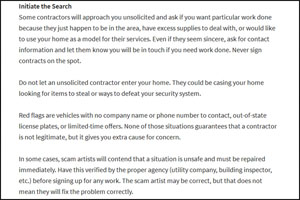
3. Cheap-Work from Home Improvement Scams
Driveway Sealant
Chimney Repair
Hot Tar Roofing
Duct cleaning and Maintenance
Contractors may warn homeowners about the presence of dangerous mold in their heating and air conditioning ductwork with the intention of scaring them into unnecessary services. They often use small vacuum cleaners that are ineffective for proper dust or mold removal. In the worst cases, when the work is not done correctly, it can damage the ventilation system and lead to serious health problems.
Recommendations
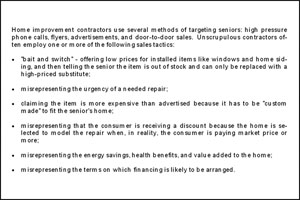
Protect yourself from invisible home improvement scams
-
Do not allow anyone to enter your home for an unsolicited inspection. Politely tell them that you will contact the company if you need assistance.
Be cautious if they arrive in an unmarked truck or display out-of-state license plates.
Conduct an online search about the contractor’s company. Check their ratings, work history, and complaint records with the Better Business Bureau (BBB).
Do not be influenced by online or print advertisements alone.
Rely on recommendations from friends, relatives, or neighbors who have had firsthand experience with the contractor.
Obtain price estimates from at least two or three different companies, and compare their offers before selecting one.
Get every detail in writing. The contract should clearly state the scope of work, the materials (including quantities) to be used, the start and completion dates, and the total cost involved. Read the contract thoroughly before signing it.
Do not make full payment upfront. Hold your payment until the agreed work is completed, or provide only a reasonable initial deposit. Always make payments by credit card or check—never by cash.
CASE STUDIES
